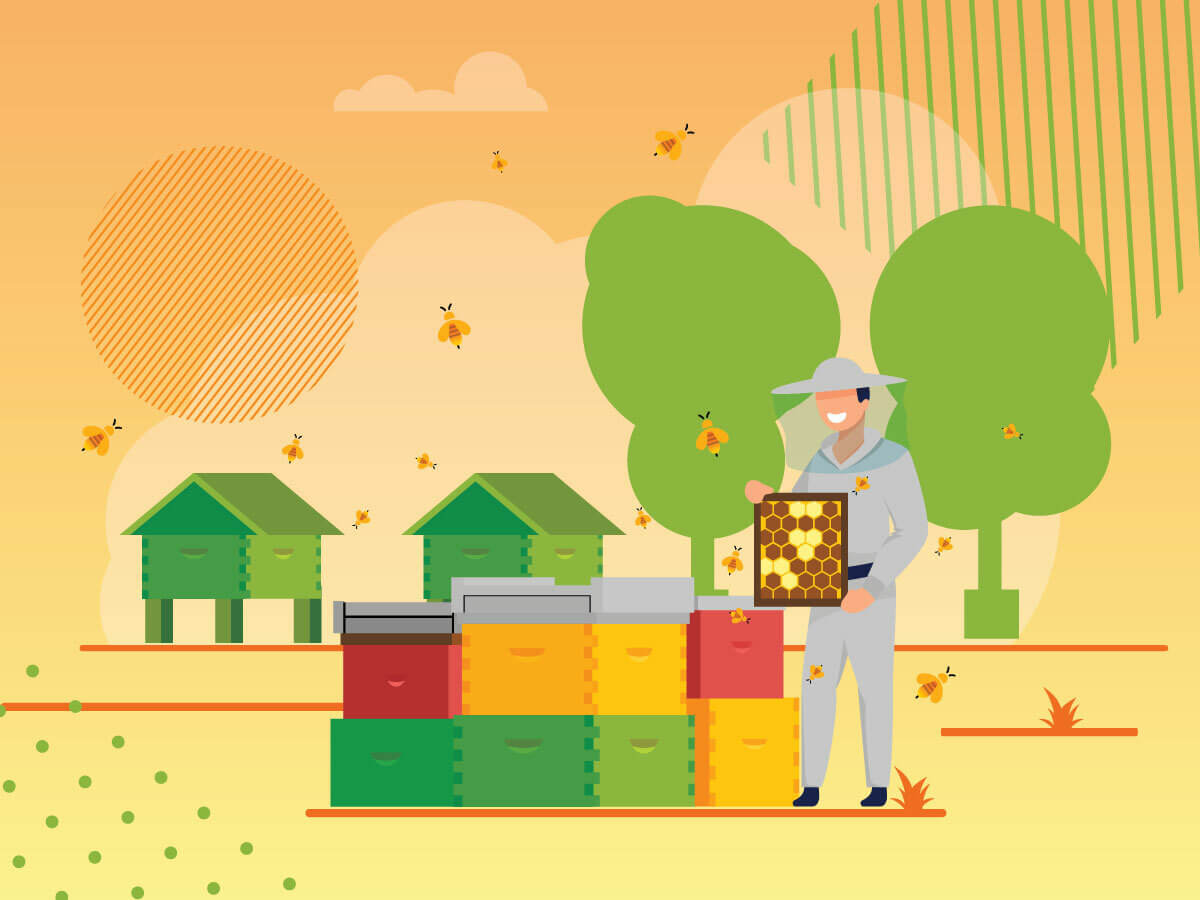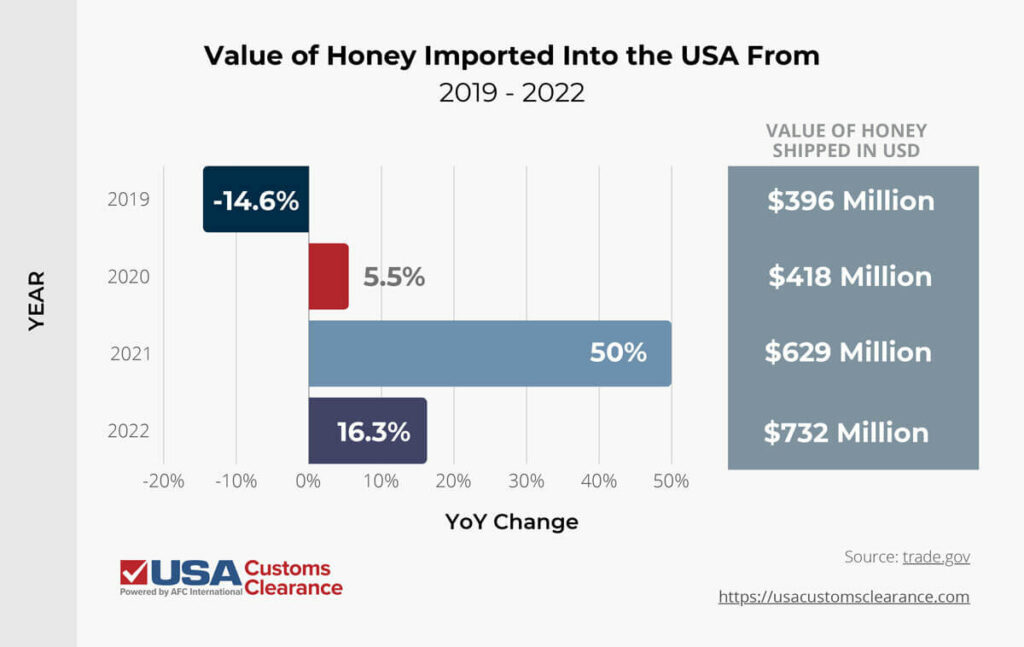
If you want to import bees into the U.S., you’ll need to make sure that you’re careful—and not because of the bees. Getting your shipment detained in customs stings, so you’ll have to make sure you’re compliant with all laws and regulations.
Key Takeaways
Join us as we review the basic and commodity-specific practices you’ll need to use if you’re importing bees.
In order to import anything into the U.S., you’re going to need to prepare some documents to send with your shipment. This applies to any type of commodity, including bees.
Those requirements are:
Because live bees are regulated by the U.S. Department of Agriculture (USDA), your bee shipment will also need to be secured by a customs bond, regardless of its overall value.
In the last several years, the American appetite for honey has exploded, leaving apiaries struggling to keep up with demand. This is illustrated in the table below, which shows how much the U.S. spends on imported honey.

Demand is high enough that some importers choose to bring in bees to set up their own hives and apiaries or supply existing ones. This improves our chances of meeting our own demand for the popular sweetener.
The first thing to be aware of when it comes to importing honeybees, also known by their scientific name Apis Mellifera, is that you are only allowed to import them into the U.S. from Canada or New Zealand. The only time you can import bees from other places is for research purposes.
Bees imported into the U.S. are regulated by APHIS, a specialized service of the USDA. . This agency sets several regulations on the behalf of the U.S., but it also works with the agricultural agencies from the exporting countries to ensure the shipment is compliant.
You need to be aware that you cannot import an entire hive. You can bring in queen bees and some attendant bees along with them, but moving an entire hive is prohibited. Packages of bees should be handled carefully to ensure the bees (and any pests) are well contained and unable to escape during their trip.
Importing the items on this list will require you to get a special permit or other additional paperwork from APHIS, such as:
Pollen used for bee feeding and used beekeeping equipment cannot be imported into the USA under any circumstances.
You should always check the General Shipping Requirements for Honey Bee Importing to make certain the country and the bees you seek to import into the U.S. are on the approval list. Follow this list of honey bee importing requirements to make sure your shipment passes through customs without incident:
You must submit a 10-day notification and a zoo sanitary certificate to the APHIS before the package arrives in the U.S. This mandate exists for express package delivery services too.
If you’re importing honey instead of bees or beeswax, there’s an entirely separate list of rules and regulations to follow. To learn more, check out our article Importing Honey to the U.S.

The original colonies from which the bees came should be inspected by the country of origin’s agricultural authority 10 days prior to shipping. These authorities are Agriculture and Agri-Food Canada for our neighbor to the north and the Ministry for Agriculture in New Zealand. After passing inspection, you will be given a Honey Bee Export Certificate that you must include with the shipment.
The exporting country’s relevant agency is responsible for conducting the initial inspection, and the export health certificate. On it, they must outline any diseases, subspecies, or parasites that were found during inspection.
Shipments will be refused entry if they contain dangerous diseases such as the Thai sacbrood virus or the varroa mite, which could wreak havoc on domestic bee populations.
Schedule an inspection and a transfer for pickup of your bee imports once the bees arrive at the airport. This will ensure they move through customs as quickly as possible.
Beeswax has many purposes in the U.S., but as stated above, beeswax for beekeeping requires additional paperwork. Specifically, it must be accompanied by an export certificate stating that the wax has been liquefied to remove honey and slumgum.
Beeswax happens to be an important element of many cosmetic products, including:
However, some of these products could be labeled as drugs if they advertise properties like UV protection, anti-aging, dandruff reduction, eczema treatment, or other health and restorative claims. Take a look at how the Food and Rug Administration (FDA) determines what is a cosmetic and what is a drug, and how the import regulations are different for each one.
As long as your beeswax is being imported for manufacturing, then it will be allowed entry to the United States.
Beeswax is regulated by the FDA, whether the final product is considered a cosmetic or a drug. The classification of the product is important since it has a direct bearing on accurate duty calculation for your shipment. If you’re unsure how to classify your imports, the services of a customs broker could prove invaluable for your business.
The regulations to import bees into the U.S. can seem imposing, especially for new importers. Importing live animals of any kind includes strict rules, and making mistakes in the process can have serious consequences for you and your bees.
Customs brokers with USA Customs Clearance are experts in the field of customs clearance, and they can take care of all the responsibilities of importing for you.
Some of the services we offer that our customers buzz about include:
Give us a call today at (855) 912-0406, or contact us online. Your beeswax is our business.
 Copy URL to Clipboard
Copy URL to Clipboard

Google is changing how it surfaces content. Prioritize our high-quality guides and industry-leading coverage in search results by setting usacustomsclearance.com as a preferred source.
Add your first comment to this post